This study examined the effect of differentsolvents on active ingredients and antimicrobial performance of fresh leaves ofOcimum gratissimum and dried buds of Eugenia caryophyllata. Plant parts wereextracted in a soxhlet apparatus using dietyl-ether, ethyl acetate, andethanol. Phytoconstituents of the plants was determined using gas chromatography-massspectrometer (GC-MS). The extract with high eugenol concentrations was preparedin seven treatments (160, 80, 40, 20, 10, 5, and 0 mg/mL) and tested againstListeria monocytogenes using agar well diffusion methods in triplicates.Minimum inhibitory concentration (MIC) and zone of inhibition were determinedusing standard technique. The data was subjected to descriptive statistics andone-way analysis of variance (ANOVA) at α0.05. The results showed that the phytochemical concentration of theextract varied significantly (p<0.05) with respect to solvents. Extract ofE. caryophyllata using ethyl acetate had highest concentration of eugenol(71.32%) while O. gratissimum had 16.67%. The results revealed anti-L.monocytogenes activities of fresh leaf of O. gratissimum and dried buds of E.caryophyllata capacity with zones of inhibition of 13.33 mm and 19.00 mmrespectively and MIC of 80 mg/ml. This establishes the possibility of usingfresh leaf of O. gratissimum and dried buds of E. caryophyllata to prevent thegrowth of foodborne bacterias, especially L. monocytogenes.





.png)